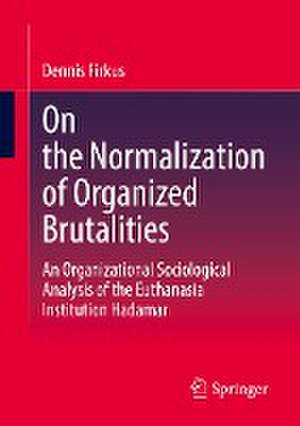On the Normalization of Organized Brutalities: An Organizational Sociological Analysis of the Euthanasia Institution Hadamar
Autor Dennis Firkusen Limba Engleză Paperback – 30 iul 2023
This book is a translation of an original German edition. The translation was done with the help of artificial intelligence (machine translation by the service DeepL.com). A subsequent human revision was done primarily in terms of content, so that the book will read stylistically differently from a conventional translation.
Preț: 491.25 lei
Preț vechi: 577.94 lei
-15% Nou
Puncte Express: 737
Preț estimativ în valută:
94.05€ • 98.13$ • 78.83£
94.05€ • 98.13$ • 78.83£
Carte tipărită la comandă
Livrare economică 12-26 martie
Preluare comenzi: 021 569.72.76
Specificații
ISBN-13: 9783658415143
ISBN-10: 3658415142
Pagini: 134
Ilustrații: VIII, 134 p. 1 illus.
Dimensiuni: 148 x 210 mm
Greutate: 0.2 kg
Ediția:1st ed. 2023
Editura: Springer Fachmedien Wiesbaden
Colecția Springer
Locul publicării:Wiesbaden, Germany
ISBN-10: 3658415142
Pagini: 134
Ilustrații: VIII, 134 p. 1 illus.
Dimensiuni: 148 x 210 mm
Greutate: 0.2 kg
Ediția:1st ed. 2023
Editura: Springer Fachmedien Wiesbaden
Colecția Springer
Locul publicării:Wiesbaden, Germany
Cuprins
Beyond Simple Explanations: An Introduction to Euthanasia.- Research Agenda: On Organized Brutalities.- On the Normalization of Illegal Practices.- The (Temporary) Stop of Aktion T4.- Air War, Disaster Medical Response, and the Hadamar Asylum.- The Second Murder Phase in Hadamar.- Conclusion: The Normalization of Organized Brutalities.
Notă biografică
Dennis Firkus, M.A., is lecturer at the Institute for Work and Employment Studies, Leibniz University Hannover, and part-time lecturer at Bielefeld University, Section Sociology of Organizations.
Textul de pe ultima copertă
This book takes an organizational sociological perspective on the systematically carried out mass murders in the context of Nazi euthanasia in Hadamar. On the basis of numerous theoretically elaborated as well as empirically proven organizational mechanisms, it is shown how these illegal practices were "normalized" in an extraordinary way by and for the personnel, who were not trained or otherwise predisposed to murder. The acts thus became a legitimate expectation of action, while organizational involvement simultaneously possessed desolidarizing, demoralizing, as well as responsibility-relieving effects.
The author Dennis Firkus, M.A., is lecturer at the Institute for Work and Employment Studies, Leibniz University Hannover, and part-time lecturer at Bielefeld University, Section Sociology of Organizations.
This book is a translation of an original German edition. The translation was done with the help of artificial intelligence (machine translation bythe service DeepL.com). A subsequent human revision was done primarily in terms of content, so that the book will read stylistically differently from a conventional translation.
The author Dennis Firkus, M.A., is lecturer at the Institute for Work and Employment Studies, Leibniz University Hannover, and part-time lecturer at Bielefeld University, Section Sociology of Organizations.
This book is a translation of an original German edition. The translation was done with the help of artificial intelligence (machine translation bythe service DeepL.com). A subsequent human revision was done primarily in terms of content, so that the book will read stylistically differently from a conventional translation.
Caracteristici
First sociological research of the topic Organizational sociological perspective on the NS On the "legalization" of illegal practices
